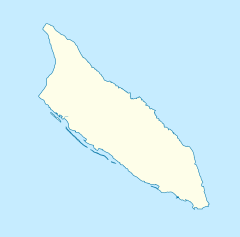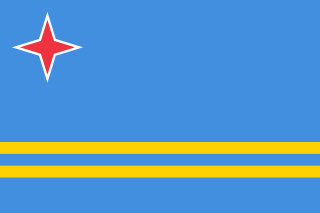
Aruba, is officially known as the Country of Aruba. It is a constituent country within the Kingdom of the Netherlands, situated in the south of the Caribbean Sea. Aruba is located approximately 29 kilometres (18 mi) north of the Venezuelan peninsula of Paraguaná and 80 kilometres (50 mi) northwest of Curaçao.
The Protestant Church in the Netherlands is the largest Protestant denomination in the Netherlands, being both Calvinist and Lutheran.
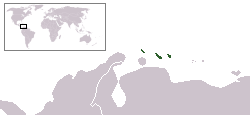
Papiamento or Papiamentu is a Portuguese-based creole language spoken in the Dutch Caribbean. It is the most widely spoken language on the Caribbean ABC islands, with official status in Aruba and Curaçao. Papiamento is also a recognised language in the Dutch public bodies of Sint-Eustatius and Saba.

Oranjestad, the capital and most populous of Aruba's eight regions, is located on the southwestern coast of the island. In Papiamento, the local language, Oranjestad is commonly referred to as "Playa" by the locals.
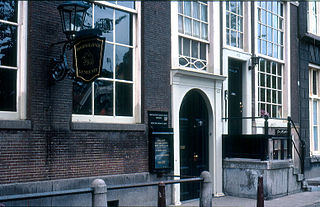
The Mennonite Church in the Netherlands, or Algemene Doopsgezinde Sociëteit, is a body of Mennonite Christians in the Netherlands. The Mennonites are named for Menno Simons (1496–1561), a Dutch Roman Catholic priest from the Province of Friesland who converted to Anabaptism around 1536. He was re-baptized as an adult in 1537 and became part of the Dutch Anabaptist movement.
The Dutch Reformed Church was the largest Christian denomination in the Netherlands from the onset of the Protestant Reformation in the 16th century until 1930. It was the original denomination of the Dutch royal family and the foremost Protestant denomination until 2004. It was the larger of the two major Reformed denominations, after the Reformed Churches in the Netherlands was founded in 1892. It spread to the United States, South Africa, Indonesia, Sri Lanka, Brazil, and various other world regions through Dutch colonization. Allegiance to the Dutch Reformed Church was a common feature among Dutch immigrant communities around the world and became a crucial part of Afrikaner nationalism in South Africa.

Gilberto François "Betico" Croes was an Aruban political activist who was a proponent for Aruba's separation from the Netherlands Antilles. This eventually occurred in 1986, but following a car accident on 31 December 1985, Croes lapsed into a coma and never became conscious to see his accomplishment. He is best remembered as "Libertador" (liberator) and as the father of the Aruban people.

Nieuwerkerk is a village in the Dutch province of Zeeland. It is a part of the municipality of Schouwen-Duiveland, and lies about 23 km south of Hellevoetsluis.

Protestantism is one of the six approved religions in Indonesia, the others being Islam, Roman Catholicism, Hinduism, Buddhism, and Confucianism. It constitutes the bulk of Christianity in Indonesia, which is the second largest religion in the country after Islam.
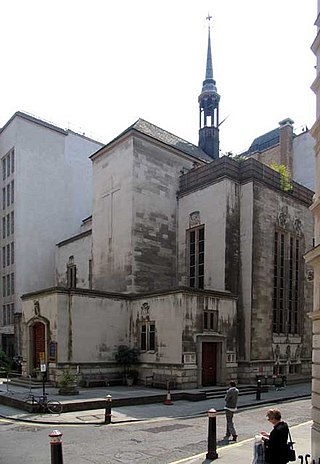
The Dutch Church, Austin Friars, is a reformed church in the Broad Street Ward, in the City of London. Located on the site of the 13th-century Augustinian friary, the original building granted to Protestant refugees for their church services in 1550 was destroyed during the London Blitz.

Protestantism in South Africa accounted for 73.2% of the population in 2010. Approximately 81% of South Africans are Christian and 5 out of 6 Christians are Protestant. Later censuses do not ask for citizens’ religious affiliations. Estimates in 2017 suggested that 62.5% of the population are Protestant.
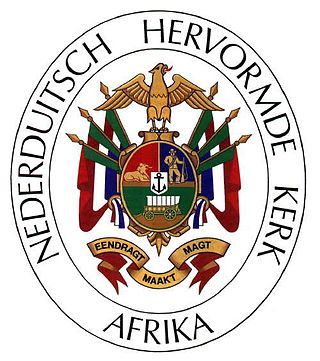
The Dutch Reformed Church in Africa is a Reformed Christian denomination based in South Africa. It also has congregations in Namibia, Botswana, Zambia and Zimbabwe. Along with the Dutch Reformed Church in South Africa (NGK) and the Reformed Churches in South Africa, the NHKA is one of the three Dutch Reformed sister churches of South Africa. The NHKA retains the old Nomenclature Nederduitsch, the word originally referring to the Dutch language. The word refers to the Low Saxon language today. The Dutch language remained the official language of the church until 1933 when the church started functioning almost exclusively in Afrikaans.
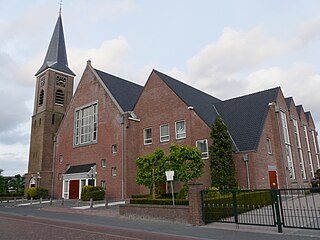
The Restored Reformed Church is a Calvinist denomination in the Netherlands. It was founded in 2004, from congregations which made up the orthodox-reformed wing of the Dutch Reformed Church; they had previously been part of groups named Het Gekrookte Riet and the still existing Gereformeerde Bond within the Dutch Reformed Church. The Church has grown steadily since its founding.
The 1886 Dutch Reformed Church split, also known as the Doleantie, was the name of a prominent schism in the Dutch Reformed Church that took place in 1886 and was led by a renowned minister, Abraham Kuyper. The Doleantie was not the first schism in the Dutch Reformed Church. Another schism, the Secession of 1834 (Afscheiding van 1834), had led to the formation of the Christian Reformed Church in the Netherlands (Christelijke Gereformeerde Kerk in Nederland).

Brussels Protestant Church is a Brussels-based Protestant Christian congregation formally constituted in 1804 and whose roots go back to the Protestant Reformation of the 16th century.
The Dutch-speaking Brussels Protestant Church or 'Dutch Church' was formally constituted in 1816 during the period when Belgium came under the Dutch House of Orange-Nassau.
The Reformed Association in the Protestant Church in the Netherlands is a confessional orthodox Calvinist group and movement within the Protestant Church in the Netherlands.

The Afrikaanse Protestantse Kerk, also known as AP Kerk, is a South African conservative Reformed Church federation with about 35,000 adherents. The federation consists of 210-240 congregations, mostly in South Africa, although the APK also includes 7 congregations in Namibia and one in London, England.

The St. Francis of Assisi Church also alternatively called Pro Cathedral of St. Francis of Assisi is a religious building belonging to the Catholic Church and serves as the pro-cathedral or temporary cathedral in the city of Oranjestad, on the Caribbean island of Aruba, an autonomous country in the Kingdom of the Netherlands in the Lesser Antilles.

The Evangelical Lutheran Church on the Breedstraat 40, Enkhuizen, is a former church of the Evangelical Lutheran Church in the Kingdom of the Netherlands. The congregation was founded in 1623 by the family of a Danish Lutheran merchant, Frederik Dirxen van Tatinghof, who had come to Enkhuizen for the trade in oxen, and was severely suppressed until 1641, when the congregation was allowed to gather in a building acquired by one of Tatinghof's sons. When the congregation shrank in the 1800s, it acquired the building at the Breedstraat and dedicated it in 1843. In 2017 it moved to another building in the city. The church on Breedstraat 40, the parsonage on no. 42, and the sacristy on no. 44 are Rijksmonuments.

